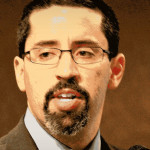 I was raised in the Southern Baptist tradition. I remember participating in Christian apologetics studies as early as high school, and many of them dealt with the question of objective truth and morality. Christian apologists like Ravi Zacharias and Josh McDowell railed against the view gaining traction in postmodernity that morality is relative or subjective. I remember watching Highway Media’s man-on-the-street interviews asking people about their views on truth, produced for the purpose of exposing these un-Christian and dangerous views.
I was raised in the Southern Baptist tradition. I remember participating in Christian apologetics studies as early as high school, and many of them dealt with the question of objective truth and morality. Christian apologists like Ravi Zacharias and Josh McDowell railed against the view gaining traction in postmodernity that morality is relative or subjective. I remember watching Highway Media’s man-on-the-street interviews asking people about their views on truth, produced for the purpose of exposing these un-Christian and dangerous views.
This was a big deal in evangelical circles. Belief in subjective morality was seen as a cancer within society, allowing people to do what they want and hold uncritical beliefs. We were taught that an important criterion for being a Christian was submitting to the idea that truth is absolute and that morality is objective, put in place by God.
Something seems to have changed.
This past year has been a particularly brutal one for the poor, the sick, and the immigrant. Millions stand to lose healthcare coverage under the new tax system. Undocumented immigrants (the majority of whom are not fence-jumping, resource-draining criminals) are being arrested and separated from their families in some new and alarming ways as the focus has shifted away from those with a criminal record (the stories of Jorge Garcia and Lukasz Niec are particularly heartbreaking). Globally, we still have a desperate humanitarian crisis in refugees fleeing violence, yet we’ve responded with travel bans, reductions and program suspensions due to perceived threats of terrorism (no refugee has ever committed an act of terror in the United States).
All of this has been happening with the support or ambivalence of a majority of white evangelicals.
Central theme of Bible
The protection of vulnerable populations is a central theme all throughout the Bible, including the Torah and the prophets.The “orphan, widow, and alien” is how they’re often collectively referred to in scripture, and the teachings are clear and numerous (Ex. 23:9, Jer. 22:3, etc.). Jesus said that fulfilled in him was God’s mission to proclaim good news to the poor and freedom to the captives (Luke 4:18), and that serving “the least of these” is tantamount to serving him (Matt. 25:40).
But when this is brought up with some evangelicals, including both common folks and high profile leaders, one almost always receives an answer something like this: these commands are meant for individuals and the church, not the government.
Jerry Falwell Jr. was drawing this distinction in a recent tweet: “Jesus said love our neighbors as ourselves but never told Caesar how to run Rome.”
Besides showing a lack of basic knowledge about Jesus’ political context, this is not internally consistent since Falwell seems to have no problem with “telling Caesar how to run Rome” when it comes to issues involving abortion or gay marriage. But here’s my main question: how is this not moral relativism? By what ethical framework do we say that individuals and churches are supposed to take one stance towards the poor and dispossessed, but as a collective nation we should take a different — even opposite — stance? If something is right or good depending solely upon who carries it out, is that not a form of moral relativism? If the guiding force for individuals and churches is mercy but for our national life together it’s cost or other factors, how do we reconcile this?
Robert Jeffress, senior pastor of First Baptist Church in Dallas, wrote an opinion piece for Religion News Service about immigration in which he says that God has instituted both the church and the government with their own distinct purposes. That the two institutions have different roles goes without saying (though this is coming from a man whose church commissioned a song called “Make America Great Again”). The question is, what are the underlying, universal values at work here? Is a merciful and compassionate society a good idea, or not? The whole point of objective morality is that it is the compass for which direction we’re headed. Of course church and government play very different roles, but Jeffress and Falwell are advocating two different value systems and trying to serve two masters. Either mercy and compassion create the kind of society God intends, or they do not.
Contrary to Falwell and Jeffress’ notion that Jesus was happy to let Caesar do as he pleases, scripture frequently holds rulers and kings accountable for administering justice and calls them out for issuing “unjust laws” and “oppressive decrees” (Isa. 10:1). But even if you leave that aside, it seems to me that if we are guided by Christ-like values, even practical or necessary restrictions would still find us earnestly seeking and advocating for the least harmful option. Few would argue that government shouldn’t place some restrictions on immigration, for example, but I rarely see this quest for merciful options among people like Jeffress. He seems quite content to leave the desperate to fend for themselves and never mentions their struggle to survive.
It didn’t start in 2016
The moral rot we’re seeing among white evangelicals has been hard to watch, and it did not start in 2016. Back in 2009, an article in the evangelical publication Christianity Today bemoaned a survey finding that 62 percent of white evangelicals support the use of torture. Despite a supposed pro-life stance, white evangelicals are also the most likely religious group to support war and the death penalty. Racism and sexual predation among elected officials are getting a pass if they deliver on policy. Charles Mathewes, a professor of religious studies at the University of Virginia, put it well: “For believers in a religion whose Scriptures teach compassion, we [white evangelicals] are a breathtakingly cruel bunch.”
Here’s a quote from a prominent evangelical author: “As it turns out, character does matter. You can’t run a family, let alone a country, without it. How foolish to believe that a person who lacks honesty and moral integrity is qualified to lead a nation and the world!” That was written by James Dobson of Focus on the Family. But he wasn’t talking about Donald Trump. He wrote that about Bill Clinton in 1998. Is this principle no longer in force, or does it only apply to Democrats?
As Robert P. Jones noted, the ends apparently justify the means. “White evangelicals have now fully embraced a consequentialist ethics that works backward from predetermined political ends, refashioning or even discarding principles as needed to achieve a desired outcome.” That’s moral relativism.
I am thankful that a growing number of evangelical leaders are having none of this. Southern Baptist ethicist Russell Moore, authors Beth Moore and Max Lucado, and Village Church pastor Matt Chandler are among those who have broken rank with their evangelical counterparts on at least some of these issues, and have joined with hundreds of others in the National Association of Evangelicals to publish an open letter calling for compassionate action for vulnerable populations.
As these leaders say in their letter, “The Bible speaks clearly and repeatedly to God’s love and concern for the vulnerable, and also challenges us to think beyond our nationality, ethnicity, or religion when loving our neighbor.” The Bible also speaks of a God who maintains this love and concern no matter who’s in power, and that mercy is a good thing, no matter who extends it.

































































